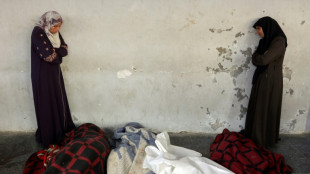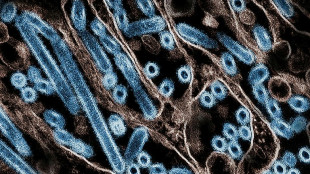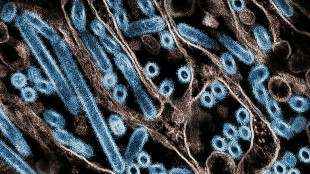
| RBGPF | 100% | 59.84 | $ | |
| SCS | 0.58% | 11.97 | $ | |
| BCC | -1.91% | 120.63 | $ | |
| CMSD | -0.67% | 23.32 | $ | |
| NGG | 0.66% | 59.31 | $ | |
| RELX | -0.61% | 45.58 | $ | |
| RIO | -0.41% | 59.01 | $ | |
| BCE | -0.93% | 22.66 | $ | |
| RYCEF | 0.14% | 7.27 | $ | |
| JRI | -0.41% | 12.15 | $ | |
| CMSC | -0.85% | 23.46 | $ | |
| VOD | 0.12% | 8.43 | $ | |
| GSK | -0.12% | 34.08 | $ | |
| BTI | -0.33% | 36.31 | $ | |
| AZN | -0.39% | 66.26 | $ | |
| BP | 0.38% | 28.96 | $ |

Thailand reports suspected case of new mpox strain
Thailand on Wednesday reported a suspected first case of the new more dangerous strain of mpox, which the World Health Organization has declared a global public health emergency.
The patient landed in Bangkok on August 14 and was sent to hospital with mpox symptoms the following morning, said Thongchai Keeratihattayakorn, head of the kingdom's Department of Disease Control.
Laboratory tests are underway to confirm the strain, but officials believe it to be from Clade 1.
The infected person, a 66-year-old European who travelled to Thailand from an African country, has been quarantined.
"We have done a test and they definitely have mpox and it's definitely not Clade 2," Thongchai told AFP.
"We are convinced the person has the Clade 1 variant, but we have to wait to see the final result in the lab for two more days."
Health officials are monitoring 42 people who came into close contact with the patient, Thongchai told a news conference.
Mpox cases and deaths are surging in Africa, where outbreaks have been reported in the Democratic Republic of Congo, Burundi, Kenya, Rwanda and Uganda since July.
The disease -- caused by a virus transmitted by infected animals but passed from human to human through close physical contact -- causes fever, muscular aches and large boil-like skin lesions.
While mpox has been known for decades, a new more deadly and more transmissible strain -- known as Clade 1b -- has driven the recent surge in cases.
Clade 1b causes death in about 3.6 percent of cases, with children more at risk, according to the WHO.
Formerly called monkeypox, the virus was discovered in 1958 in Denmark in monkeys kept for research.
DR Congo has reported more than 16,000 cases and 500 deaths this year.
On August 15 Sweden reported the first confirmed Clade 1 case outside Africa.
V.Merendino--LDdC



